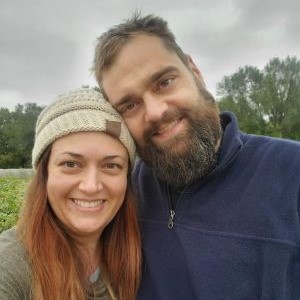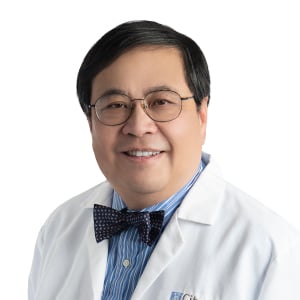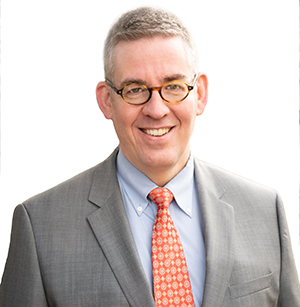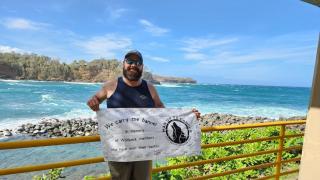
Jason Randall has a dream.
The 40-year-old digital cartographer and Navy vet from Eudora, Kansas, hopes to build a unique retreat where cancer survivors can decompress, escape the overwhelming, all-consuming fight they’ve just been through, begin to heal spiritually as well as physically, and return to their lives before cancer.
His dream has a name — Kohala Healing House — and a proposed location: Hawaii’s Big Island, also known as “The Healing Island” — described in tourist guides as “a place where a strong tradition of wellness combines with the aloha spirit to nurture the soul.”
Randall experienced that healing spirit firsthand on a Hawaii trip in 2021. It was a gift from his family and a welcome respite from a multiyear battle with metastatic colon cancer that began out of the blue, sent him to the lowest of lows, then miraculously — with a big assist from social media and a pair of renowned City of Hope surgeons — pulled him up and saved his life.
An early sign of possible trouble emerged shortly after he enlisted. In 2005, Randall experienced stomach distress and was diagnosed with GERD, more commonly known as acid reflux disease. Doctors gave him acid-inhibiting medications like Prilosec and Zantac. He would take them for years. They seemed to work.
Was that GERD episode the beginning? No one can say for sure. Nor can anyone definitively connect Randall’s cancer to toxic exposures he experienced in the Navy, while stripping down and rebuilding the aircraft carrier USS Eisenhower, as well as from so-called “burn pits” in the Persian Gulf.
What doctors do know is that an increasing number of young people are developing colon cancer and that, for many, their tumors may have been growing for some 10 to 15 years.
A Stage 4 Colon Cancer Diagnosis
In Randall’s case, everything seemed fine until 2018, when he was 35 years old, married with two children and a baby on the way. Suddenly he endured two weeks of severe distress, including cramping and an inability to move his bowels. A series of scans revealed that he had Stage 4 disease: a large tumor at the point where the rectum and colon meet, plus cancerous lesions covering 80% of his liver.
The news, and the grim prognosis, hit hard.
“I felt blindsided,” he said. “It was totally shocking to me. I thought, ‘Did I just wake up in some bad dream?’ I was living a nightmare. I just lost it. I’m crying. I called my wife, and she starts crying, too.
“I’m starting to wonder,” he continued, choking up, “what about my kids? Will I live long enough to see the third one born? Will I see my 2-year-old grow up? Will I make it to my daughter’s wedding? How can I leave my wife to raise three children alone?”
'The fact is, today we can clear the liver, help people live longer, and 30-40% of them can be cured.'
Yuman Fong, M.D., on metastatic colon cancer
Randall needed some hope, even a glimmer, but his Kansas doctors provided none. They offered chemotherapy but considered his tumors to be inoperable. He would remain on chemo for life, they said, without saying how long (or short) that might be.
He began chemotherapy in August 2018, a “kitchen sink” regimen called FOLFIRINOX — an acronym for a powerful, multidrug combo of leucovorin calcium (folinic acid), fluorouracil, irinotecan hydrochloride and oxaliplatin. He also received Y-90 treatments, in which radioactive beads were injected directly into his liver.
The treatments were rough (“hit me like a ton of bricks,” he recalled), but they worked. By October 2018, Randall’s tumors had shrunk by more than 40%, and they kept diminishing. Surely now he could have surgery to remove the remaining cancer, he thought.

The tumor board said no. “Not what I wanted to hear,” he said ruefully. It didn’t make sense to him. He resolved to dig deeper, with a little help from his online friends.
By this time, Randall had discovered Colontown, a community of more than 130 private groups on Facebook for colorectal cancer patients and care partners. Randall crowdsourced for a second opinion and got one quickly. “This literally saved my life,” he insists.
Yuman Fong, M.D., wasn’t surprised that a guy from Kansas had heard about him or that there was a “Yuman Fong Fan Club” on a social media site.
Traveling for Metastatic Colon Cancer Care
“These days, 80% of my patients come from outside California,” said Fong, City of Hope’s Sangiacomo Family Chair in Surgical Oncology and a world-renowned liver surgeon. “Social media allows patients to talk to each other and learn from each other,” something that was much more difficult in previous eras.
In late 2019, Randall and his wife Tellena decided to fly from Kansas to City of Hope’s Duarte campus, hoping to get a better prognosis. Their first meeting with Fong convinced them they were in the right place.
“It was like meeting a legend,” said Randall, effusively describing how thorough Fong was, how he had a game plan for surgically eliminating all the remaining cancer. “It was so reassuring, after having no hope for so long.”
But what had Fong seen that the other doctors hadn’t?
“Ten thousand more cases,” said Fong matter-of-factly. It was no idle boast. With over 30 years’ experience in the operating room, Fong has seen, and helped bring about, profound changes. Surgical techniques have vastly improved. Drug therapy is much better at shrinking tumors. And most important, cancer in the liver no longer automatically means “inoperable.”
“I grew up when nobody with metastatic cancer in the liver got surgery,” he said. “In fact, we were called charlatans for thinking otherwise! But the fact is, today we can clear the liver, help people live longer, and 30-40% of them can be cured.”
Not that it would be easy. Or quick. Randall’s procedure took place in February 2020. It took 12 hours and required two surgeons. Fong removed the entire right side of Randall’s liver and excised any remaining lesions on the left. His colleague, Andreas M. Kaiser, M.D., professor and chief, Division of Colorectal Surgery, Department of Surgery, eliminated the rectosigmoid tumor, removed a section of the colon and a portion of the rectum, and created a temporary ileostomy — placing the end of the small intestine through the abdomen to collect waste into an external bag — to allow the colon to heal.

The tag-team approach is nothing new, said Fong. “We’ve done so many of these now; we do them very well.”
It worked out very well for Randall, but not without a few bumps. Back home in Kansas, cancer appeared in his lung, requiring an ablation procedure. It also manifested in his tailbone, which was treated first with pelvic radiation followed by an abdominal perineal resection, which removes the anus, rectum, tailbone and part of the sacrum. Though his temporary ileostomy had been reversed, Randall now needed a permanent colostomy through the abdomen, since his normal path for eliminating waste no longer existed.
Randall handled it all — especially the colostomy — like the tough, optimistic, disciplined Navy guy that he is. In fact, he now welcomes the ubiquitous external pouch, because it means he can devote a mere few minutes a day on bodily needs rather than the hours he was spending in the bathroom before. It doesn’t hinder his lifestyle. He swims nearly every day, and his weight — he’d lost over 100 pounds during this entire ordeal — is now back to normal.
No Evidence of Disease
He has now gone 2 ½ years without chemotherapy and for 16 months has been declared “NED”: no evidence of disease.
He is giving back, serving now as a Colontown cabinet member, and lending his digital expertise to Man Up to Cancer, an organization that helps men with the disease support each other.
And of course, there’s Hawaii, where he hopes one day to help many others say “aloha” to cancer.
In the meantime, he heaps praise on City of Hope — “Everyone is so helpful, so welcoming. It’s a breath of fresh air”— and he keeps referring people to Fong: some 150 at last count. “He’s a great surgeon,” he said. “And such a kind human being.”
Right back at you, says Fong.
“I’m so glad he’s well and giving back to the folks around him. And I wish I had more hours in the day to take care of more people just like him.”
